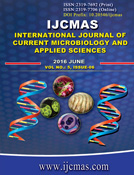


 National Academy of Agricultural Sciences (NAAS)
National Academy of Agricultural Sciences (NAAS)

|
PRINT ISSN : 2319-7692
Online ISSN : 2319-7706 Issues : 12 per year Publisher : Excellent Publishers Email : editorijcmas@gmail.com / submit@ijcmas.com Editor-in-chief: Dr.M.Prakash Index Copernicus ICV 2018: 95.39 NAAS RATING 2020: 5.38 |
The aim of this study is to investigate the bacteriology of urinary tract infection associated with indwelling DJ stent. A total of 50 stents were included in the study, during a period was for 6 months carried out in the department of microbiology, PGIMS, Rohtak. Prophylactic antibiotic was given at the time of intervention. Mid stream urine samples for routine and culture were sent before intervention. Urine samples during DJ removal and DJ tip cultures were also sent. All patients were “stented” during the various open and endourological procedures. A total of 50 cases were included. Mean age in years was 35.70 (10- 78years).Male were 24 and female 26. Of the pathogens identified, CONS was found to be the most common. An increased stent colonization rate was associated with implantation time, female sex. Positive urine culture and positive DJ tip cultures had strong correlation. Longer duration of placement of stent showed stent colonization. The commonest pathogen was Coagulase negative Staphylococcus.
 |
 |
 |
 |
 |